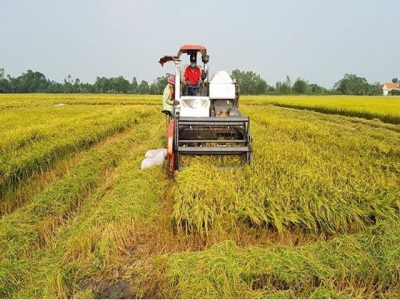Rice exports to China plummet in H1

Rice exports to China have slumped in volume. In a file photo, farmers are seen harvesting rice - PHOTO: TRUNG CHANH
CAN THO – Rice exports to mainland China took a sharp plunge in volume in the first half of the year, particularly last month, following China’s stringent requirements on rice products.
During the January-May period, rice exports to China reached 884,000 tons worth more than US$440 million, down by 21.1% in volume and 7.6% in value year-on-year, according to statistics from the Ministry of Agriculture and Rural Development.
In June, however, China imported merely 48,000 tons of Vietnamese rice, a drop of 112,000 tons compared with the same period last year, falling behind even the lowest monthly shipment to this market in 2016, said Nguyen Dinh Bich, a rice market analyst.
Despite the fall, China remained the largest rice importer of Vietnam, as the country's total rice export volume during the first six months of 2018 stood at an estimated 3.6 million tons worth US$1.8 billion.
According to local rice exporters, the sudden fall in rice exports was attributed to tight control over rice products, as China made adjustments to its importing policies by end-2017. Particularly, only 22 Vietnamese rice exporters among 150 owning Vietnamese exporting licenses are allowed to ship rice to the neighboring country.
In addition, at the start of this year, China blew the whistle on three Vietnamese rice exporters among the aforesaid 22, as the amount of weed seeds contained in their broken rice products exceeded the permissible limit.
Simultaneously, China has also controlled the import volume of broken rice since the end of 2017, causing Vietnamese rice exporters to stop exporting this rice to the northern country, said Luu Thi Lan, deputy director of Gentraco JSC. She also attributed the tumbling rice export volume to the strengthening US dollar as well.
Besides, from July 1, 2018, China imposed new import tariffs of 50% on sticky rice, which is 45 percentage points higher than previous tariffs. Vietnam had annually exported over one million of tons of sticky rice to China in 2016 and 2017.
Earlier, plenty of local exporters had reportedly supplied a large quantity of broken rice to Chinese cake-making and wine-processing plants, Lan noted, adding that Vietnam had exported some 700,000 tons of broken rice to China last year, which is why the strict control had negatively affected the rice export revenue in the first half of this year.
Có thể bạn quan tâm
 Hai Phong works to develop value chain for agro-fisheries products
Hai Phong works to develop value chain for agro-fisheries products The northern port city of Hai Phong has rolled out several measures to support and form value chains for its agro-fisheries products.
 Vietnam rice farmers in a sticky situation
Vietnam rice farmers in a sticky situation Production of sticky rice in the Mekong Delta over the past weeks has faced challenges due to China’s new import tariff policy, forcing a strong reduction
 Fruits and vegetables export is slowing down
Fruits and vegetables export is slowing down In the first 6 months of 2018, fruits and vegetables export gained a good growth rate with a year-over-year increase of 20.3%